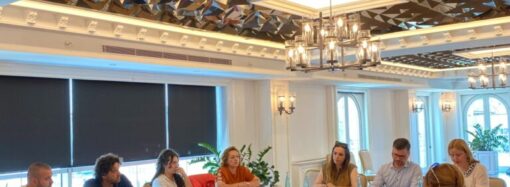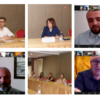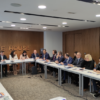On May 21, 2025, in Tirana, a meeting of the Working Group for Chapter 24 was held as part of the National Convention for European Integration, organized by the European Movement in Albania (EMA) in cooperation with the Albanian Financial Intelligence Agency (AIF). The meeting focused on raising awareness regarding the implementation of the Public Education Strategy on Anti-Money Laundering and Countering the Financing of Terrorism 2025–2027, and the role of civil society and the private sector in combating money laundering.
In his opening remarks, Ervin Koçi, Director General of AIF, emphasized that without the involvement of business sector actors, civil society, academia, and the media, institutional efforts alone would be insufficient. He stressed the need for comprehensive cooperation and a broader contribution from these stakeholders in raising awareness and informing the public about the risks posed by money laundering. Koçi noted that AIF, in collaboration with other responsible institutions, has conducted and continues to carry out awareness activities, trainings, and seminars in cooperation with schools and universities to educate from an early age, as well as with businesses and civil society organizations. According to him, the media is a key actor in this process, and closer cooperation is needed to promote institutional activities and initiatives. He concluded by praising the collaboration with the Chamber of Commerce and Industry in Tirana and with civil society organizations such as EMA, which contribute through their activities, expertise, and active involvement in public education on these issues.
Gledis Gjipali, Executive Director of EMA, underlined that with the intensification of the EU integration process, institutional responsibility to fulfill obligations has also increased. However, he stressed that this process cannot be completed without the involvement of other societal actors. Civil society, business, and academia are not only stakeholders but are also directly affected by the alignment with EU standards. Their engagement is essential for a better understanding of the impacts and costs of reforms. He added that discussion platforms such as this roundtable are important for granting these actors a more proactive role in collaboration with public institutions. Gjipali also highlighted the synergy between the National Convention on European Integration and the European Integration Partnership Platform, which brings successful examples of cooperation between public institutions and non-state actors. He emphasized the need for further strengthening of dialogue and cooperation throughout the process.
Nikolin Jaka, President of the Chamber of Commerce and Industry in Tirana, pointed out the need for the Albanian business community to meet both national and international standards in order to build an efficient, sustainable, and competitive economy. He emphasized the necessity of greater investment in human resources and technology from the business sector to prevent money laundering. According to him, this phenomenon negatively impacts the credibility of Albanian businesses, and thus, meeting standards is essential. He added that it is time for the business sector to become more proactive and to take on its role as a dignified partner in the integration process.
Agim Muslia, Director of Compliance and IT at AIF, presented the objectives, target groups, measures, and activities of the Public Education Strategy on Anti-Money Laundering, which is currently being implemented as part of the national strategy against money laundering and terrorist financing. He highlighted that the main goal is to clearly and simply explain the negative effects that this phenomenon has on a country’s economy, businesses, society, and security. Even after EU membership, the challenge of money laundering will persist—therefore, he noted, preparation is needed not only at the institutional level but also through the active involvement of other stakeholders. Muslia emphasized that the implementation of the strategy is being continuously monitored. He stressed the importance of education through public events, media campaigns, and trainings, as well as the need for interinstitutional coordination and concrete cooperation with the private sector and civil society, including the involvement of schools, universities, and the media.
Meanwhile, Andrej Leontiev, lawyer and AML expert from Slovakia, shared concrete examples from the European Union regarding the role of non-state actors in the drafting of the Sixth Anti-Money Laundering Directive. He emphasized the role of so-called “gatekeepers,” such as journalists and civil society organizations, in reporting discrepancies in beneficial ownership registers. According to him, fulfilling this mission requires cooperation from public institutions, which should provide clear and easily trackable data, as well as commitment and self-engagement from the private sector in reporting suspicious cases. Leontiev noted that 95% of reported cases in Slovakia have come from non-state actors. He presented Slovakia’s awareness model, which includes preparing the information, implementing it, and disseminating it on a wide scale, followed by knowledge testing among the relevant actors. In conclusion, he stated that phenomena such as corruption and money laundering cannot be fully eradicated, but they can be made undesirable by increasing their transactional costs.
The meeting concluded with a lively discussion among participants—representatives from civil society, the business community, academia, and young professionals—who exchanged ideas and recommendations for strengthening cooperation and carrying out joint activities aimed at raising awareness and fighting money laundering.




















